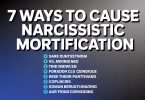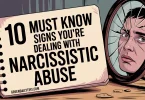Thriving After Narcissistic Abuse: Seven Secrets to Reclaiming Your Life Narcissistic abuse can inflict deep psychological scars, and the journey to recovery requires time, patience, and abundant self-compassion. In this article, we’ll delve into seven essential strategies not just for surviving but for truly thriving after such abuse.
These actionable tips can be implemented immediately to accelerate your healing and help you reclaim your joy. So, settle in, maybe grab a notebook, and let’s explore these secrets together. Remember, healing isn’t a linear process, and there’s no one “right” way to do it. Honor your journey and trust in your inner strength to not just survive but thrive.
1. Rebuild Your Self-Esteem
One of the most damaging effects of narcissistic abuse is the erosion of self-esteem. Being constantly told you’re not good enough or that your perceptions are wrong can deeply embed those harmful messages in your psyche. Therefore, a critical step in healing is the active and consistent rebuilding of your self-esteem.
Engage in activities that affirm your worth and remind you of your value. This might mean taking up a new hobby, learning a new skill, or doing something that gives you a sense of accomplishment. For others, it might involve volunteering or helping others, which can instill a profound sense of purpose. Simple acts of self-care—like nourishing your body with healthy food, exercising regularly, and ensuring rest—are also vital. Treating yourself with kindness sends a powerful message to your psyche that you are deserving of love and care. Make rebuilding your self-esteem a daily practice, and over time, you’ll begin to internalize a new, empowering narrative. Remember, you are worthy, capable, and deserving of feeling good about who you are.
2. Embrace Self-Compassion
Thriving after narcissistic abuse also requires learning to extend compassion to yourself. It’s common to blame yourself for the abuse, feeling shame and regret for choices made or endured. However, holding on to self-blame keeps you stuck in the pain of the past. To move forward, you must embrace self-compassion—treat yourself with the kindness you would offer a dear friend.
This involves forgiving yourself for perceived mistakes, and recognizing that you did the best you could with the knowledge and resources available at the time. Perfection is unattainable, and embracing your humanity is crucial. Practice speaking to yourself as you would to a beloved child or cherished friend. If you wouldn’t say harsh things to them, don’t say them to yourself. Self-compassion isn’t about making excuses; it’s about offering yourself the grace all humans deserve. Be your own best friend and most ardent supporter, creating space for true healing and growth.
3. Engage in Positive Self-Talk
Building on self-compassion, and engaging in positive self-talk is another key to thriving. The way you speak to yourself profoundly influences your beliefs, emotions, and actions. After abuse, your inner monologue may echo the narcissist’s criticisms, leading you to think negatively about yourself. However, you have the power to change this narrative.
With persistence, you can replace negative thoughts with empowering, self-affirming ones. Develop a set of affirmations—positive statements that resonate with you. Repeat them daily, even if they don’t feel entirely true at first. Over time, they’ll become part of your automatic thought patterns. When negative self-talk arises, consciously reframe those thoughts. For example, if you think, “I’m a failure,” reframe it as, “I’m learning and growing every day.” Remember, you control your mind. With practice, you can quiet the inner critic and amplify your wise, loving self, laying the foundation for thriving after abuse.
4. Reconnect with Your Passions
Narcissistic abuse can cause you to lose touch with yourself, focusing instead on pleasing the narcissist. Reconnecting with your passions and interests is crucial for thriving after abuse.
This isn’t just about hobbies—it’s about rediscovering parts of yourself that may have been suppressed during the abuse. Reflect on what you loved before the relationship. What brought you joy and fulfillment? Re-engage with these activities, whether it’s painting, hiking, singing, or something else. Exploring new interests can also help you reconnect with your authentic self. This process affirms your value and worth independent of any relationship. Rediscovering your passions is an act of self-love and reclamation, a crucial step in learning to thrive.
5. Develop a Support Network
Healing from narcissistic abuse is not something you have to do alone. A strong support network—people who offer understanding, encouragement, and validation—is vital for thriving.
This network might include friends and family who have stood by you, as well as other survivors who share similar experiences. Professionals like therapists can also provide essential guidance and support. Reach out for help—it’s a sign of strength. Surround yourself with people who contribute to your sense of safety and joy, and set boundaries with those who drain your energy. Remember, you control how much you share and with whom. Let yourself be supported by those who love you, as their belief in you can be a powerful reminder of your strength.
6. Practice Mindfulness
Narcissistic abuse can leave you in a constant state of anxiety, always on high alert. While this response was necessary during the abuse, it can be exhausting afterward. Mindfulness can help you break this cycle.
Mindfulness involves being present in the moment without judgment. It’s about observing your thoughts and emotions without being overwhelmed by them. Practice breath awareness, where you focus on your breath for a few minutes each day. You can also bring mindfulness to daily activities, like eating or walking. Over time, mindfulness can help you meet life’s challenges with greater calm, clarity, and resilience, which are essential for thriving after abuse.
7. Seek Professional Help
While all these strategies can support your healing, there’s no substitute for professional help. A therapist who specializes in trauma and narcissistic abuse can offer personalized guidance, helping you process the complex emotions that arise.
If you consider therapy, seek out a practitioner with experience in narcissistic abuse and complex trauma. Joining a support group for survivors can also provide valuable connections and understanding. Remember, seeking help is a courageous step toward reclaiming your life. You don’t have to do this alone—some people understand, care, and can guide you toward the thriving life you deserve.





Leave a Comment